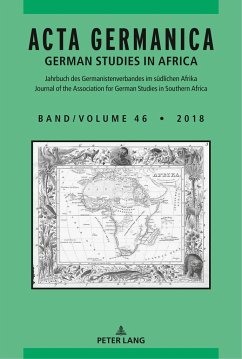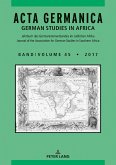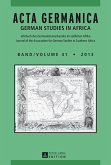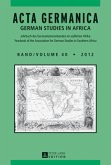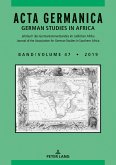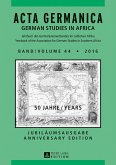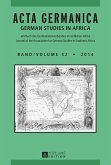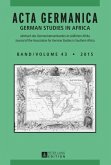Die ersten beiden Beiträge, die Briefe Therese von Bacherachts aus Java sowie Alexander von Humboldts Bezug zu Afrika im Kontext des 19. Jahrhunderts untersuchen, zeigen, dass der afrikanische Kontinent vielleicht mehr als jeder andere bis heute stellvertretend für weltweite imperiale und koloniale Bestrebungen Europas angesehen werden kann. Weitere Analysen im ersten Teil befassen sich mit wissenschaftlichen Untersuchungen zum Kolonialkrieg in Namibia, einem weitgehend vergessenen Roman Arnold Kriegers und einem aktuellen Krimi, der Gates Communities in Südafrika thematisiert. Es folgen Evaluationen der deutschen Übersetzung eines Textes von Wole Soyinka sowie einer DaF-Unterrichtseinheit in Südafrika zum Thema Polygamie. Im zweiten Teil wird ein fast unbekannter Text von Johanna Spyri vorgestellt, die Figur des John in Brechts Stück Baal neu evaluiert und der Versuch unternommen, Zugehörigkeit auf ihre Validität als literarische Analysekategorie zu prüfen. Kritische Auseinandersetzungen mit Werken von W.G. Sebald und Felicitas Hoppe beschließen den Band.
The first two contributions, which investigate letters written by Therese von Bacheracht from Java as well as Alexander von Humboldt's connection to Africa, both within the context of the 19th century, demonstrate that the African more than any other continent can perhaps be viewed as representative for worldwide imperial and colonial European endeavours in the past. Further contributions in the first part analyse critical readings of the colonial war in Namibia, an almost forgotten novel by Arnold Krieger as well as a contemporary crime novel, which highlights gated communities in South Africa. Evaluations of the German translation of a text by Wole Soyinka and of a teaching unit on polygamy within the context of foreign language instruction in South Africa follow. The second part presents general contributions on an almost unknown text by Johanna Spyri, on the figure of John in Brecht's play Baal as well as an attempt to examine belonging as a valid literary category of analysis. Critical readings of works by W.G. Sebald and Felicitas Hoppe conclude the volume.
The first two contributions, which investigate letters written by Therese von Bacheracht from Java as well as Alexander von Humboldt's connection to Africa, both within the context of the 19th century, demonstrate that the African more than any other continent can perhaps be viewed as representative for worldwide imperial and colonial European endeavours in the past. Further contributions in the first part analyse critical readings of the colonial war in Namibia, an almost forgotten novel by Arnold Krieger as well as a contemporary crime novel, which highlights gated communities in South Africa. Evaluations of the German translation of a text by Wole Soyinka and of a teaching unit on polygamy within the context of foreign language instruction in South Africa follow. The second part presents general contributions on an almost unknown text by Johanna Spyri, on the figure of John in Brecht's play Baal as well as an attempt to examine belonging as a valid literary category of analysis. Critical readings of works by W.G. Sebald and Felicitas Hoppe conclude the volume.

